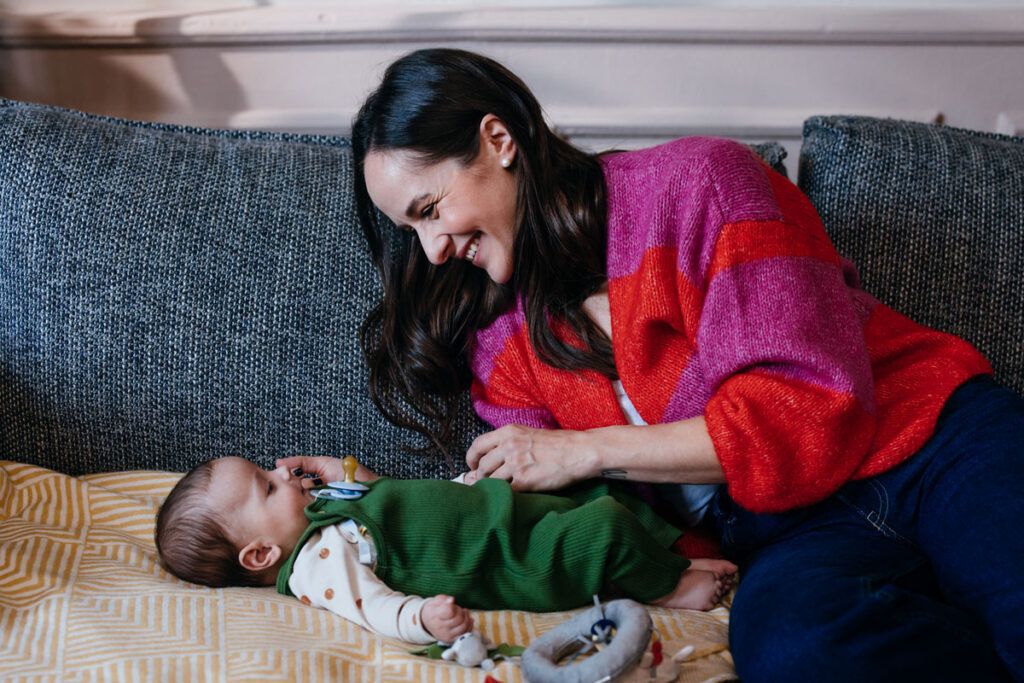Attention deficit hyperactivity disorder (ADHD) is a common mental health condition that can result in symptoms such as impulsivity and hyperactivity.
While babies cannot be diagnosed with ADHD, children from the ages 4 years onwards can receive a diagnosis when the signs and symptoms of ADHD become more noticeable.
About 8.4% of children have ADHD. The Centers for Disease Control and Prevention (CDC) highlights that there are no clinical guidelines for diagnosing ADHD in children under 4 years old.
Symptoms

Babies cannot be diagnosed with ADHD because they are still developing their ability to communicate and move. Some common signs and symptoms of ADHD may also just be typical behaviors for a developing baby. The National Institute of Mental Health (NIH) says that the common signs of ADHD include the following:
Inattention
Inattention is the inability to focus. You may notice a child finds it difficult to stay on one task, becomes easily distracted, or has a short attention span.
Hyperactivity
Hyperactivity describes excess movement that isn’t appropriate for the environment that your child is in.
It might look like a lot of:
- squirming
- restlessness
- difficulty staying still
Impulsivity
Impulsivity describes making quick decisions without enough thought. It might include engaging in harmful actions or grabbing things without thinking it through.
A 2023 review found that infants and toddlers showing impulsivity, inattention, and hyperactivity may be more likely to develop ADHD as children.
In babies, the following may also indicate a greater likelihood of developing ADHD as a child:
- Difficult temperament: An older study from 2014 found that a baby with a fussy temperament may be more likely to develop ADHD than a baby with a calm temperament.
- A delay in motor and language development: The same study also found that babies who have delayed development in movement and language at ages 9 months and 18 months may be more likely to develop ADHD. But a review from 2020 suggests that looking at the motor skills of babies may not help predict whether they will develop ADHD.
If you are concerned that your baby may have ADHD, it can be helpful to speak with a doctor. In babies, the common signs of ADHD can be just a typical part of their development and may not mean your child will have the condition.
Causes
Experts are not clear on the exact cause of ADHD. But the National Alliance on Mental Illness (NAMI) suggests that possible causes could include:
- Genetics: Your baby may be more likely to have ADHD if you or someone else in your family has ADHD. The condition often runs in families.
- Environmental factors: Alcohol use and smoking during pregnancy are thought to have a link to children developing ADHD. Lead exposure in children may also increase the likelihood of childhood ADHD.
Diagnosis
From the age of 4 years, children can receive a diagnosis of ADHD. The American Academy of Pediatrics (AAP) sets out the following steps for doctors when diagnosing children with ADHD:
- Consider whether a child has behavioral or academic problems involving impulsivity, inattention, or hyperactivity.
- Get reports from parents, caregivers, school staff, or health workers on the child’s symptoms.
- Use rating scales and other sources to track the symptoms and ensure the child meets the criteria to get a diagnosis of ADHD.
- Rule out any other causes of the child’s symptoms.
- Check for other conditions that can appear alongside ADHD, such as anxiety, depression, autism spectrum disorder, or sleep disorders.
- Get a referral to a specialist if the child has another condition the doctor can’t effectively treat or diagnose.
Treatment
A baby will not be diagnosed or receive treatment for ADHD. They must be old enough to get a diagnosis, after which treatment for young children can involve parent training and medication.
Parent training
The American Psychiatric Association highlights that for preschool-age (3-5 years old) and younger children, the first line of treatment is a form of parent management training and school intervention.
Parent training programs aim to provide parents with the tools to manage a child’s ADHD-related behaviors. Parent-Child Interaction Therapy (PCIT) is also a type of therapy that can help young children and their parents with ADHD.
Medication
In preschool-aged children, the FDA only approves amphetamines, such as Adderall, for treating ADHD. But the American Psychiatric Association says that methylphenidate, such as Ritalin and Concerta, may be a helpful medication option if behavioral treatments haven’t worked.
Once a child is older, their medication options for ADHD may also include:
- clonidine (Kapvay)
- guanfacine (Intuniv)
- atomoxetine (Strattera)
- dextroamphetamine (Xelstrym)
- viloxazine (Qelbree)
- methylphenidate (Ritalin, Concerta)
It’s important to know that the side effects of ADHD medications can vary depending on the drug prescribed but can sometimes cause:
- abdominal pain
- trouble sleeping
- headaches
- a loss of appetite
- irritability
Consider speaking with a healthcare professional to determine the most suitable medication option for your child.
If you need help covering the cost of medications, the free Optum Perks Discount Card could help you save up to 80% on prescription drugs. Follow the links on drug names for savings on that medication, or search for a specific drug here.
